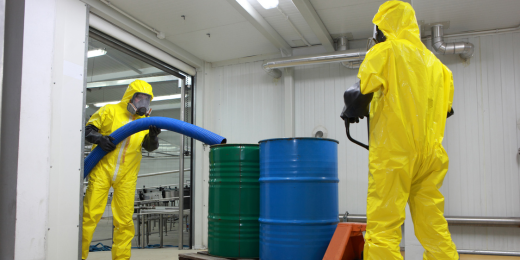Not known Incorrect Statements About Reclaim Waste
Not known Incorrect Statements About Reclaim Waste
Blog Article
Not known Details About Reclaim Waste
Table of ContentsFascination About Reclaim WasteReclaim Waste for BeginnersEverything about Reclaim WasteHow Reclaim Waste can Save You Time, Stress, and Money.The Ultimate Guide To Reclaim WasteGetting The Reclaim Waste To Work

Never place damaging materials down sinks, bathrooms or stormwater drains Compounds including gasoline, grease, oil, pesticides and herbicides, and solvents such as paint strippers ought to not be put down sinks, bathrooms or stormwater drains. These materials are hard to remove in the sewer treatment process and create pollution problems in our neighborhood waterways.

Although liquid waste is a term that covers a wide selection of materials, there's an excellent reason that leaving its disposal to the specialists is suggested. Liquid waste is non-solid material that has no more usage and must be dealt with and dealt with according to local, state and federal guidelines.
The 2-Minute Rule for Reclaim Waste
Although instances of fluid waste can include wastewater, fats, oils or oil, used oil, fluids, solids, gases or sludges and dangerous house liquids, there are some that are thought about to be more dangerous than others when it involves the atmosphere and the wellness of pets and human beings alike. It's therefore that each state and region have actually rigorous guidelines connected to fluid waste administration.
Liquid waste can be saved in holding storage tanks or packaged in drums, intermediate mass containers or approved tiny containers before either being dealt with or gotten rid of via outsourced vacuum vehicles. Offered the nature of the materials, liquid waste can not enter the general waste stream and there are strict regulations on just how to take care of it correctly.
(http://peterjackson.mee.nu/do_you_ever_have_a_dream#c2256)Relying on a decision of the level of threat, it may be essential to remediate those websites. Additionally, harmful liquid chemical wastes are regulated waste and should be tracked in accordance with the state waste regulation. Under the chain of guardianship and responsibilities, proprietors are liable and accountable for waste produced by an organization.
One of the core applications for superabsorbent polymers (SAPs) is liquid waste solidification. industrial wastewater treatment. SAPs are utilized by waste administration professionals to avoid potentially dangerous fluids from getting in rivers, groundwater aquifers, and various other delicate settings. Due to the fact that fluids can rapidly move pollutants right into ecological receptors and potentially add to geotechnical failings, fluid wastes are virtually constantly banned from disposal in landfills
Things about Reclaim Waste
Primarily, totally free liquids are fluids that separate from the strong part of waste product. Fluid waste can include the following: HDD mud and cuttings Garbage dump leachate Wastewater therapy sludge & biosolids Dug up debris Oil and gas drill cuttings Resolving pond muck Hydro Excavation slurry Coal burning residuals/ash Container base sludge Concrete grinding/polishing slurry Relevant Article: For a functional example of complimentary fluids separating from waste product, think about the complying with scenario: A waste monitoring specialist loads a dump truck with sludge from a wastewater treatment plant's aeration container, throughout a regular upkeep occasion.
When the chauffeur gets here at the land fill, he notifications water leaching from the sludge and pouring from the dump vehicle. The lots was turned down by the garbage dump and the vehicle driver was compelled to deal with the waste as a fluid waste at an unique center, which boosted the disposal costs tremendously.
The world is sinking in rubbish and we can't pay for to be untrustworthy anymore. We need to take activity and recycle whatever we can any place we can. We additionally require to be liable for the correct disposal of our waste products. It is not sufficient that we pay garbage disposal companies to deal with our rubbish.
The 6-Minute Rule for Reclaim Waste

Segregating your waste can begin inside the home. Set apart dry and liquid waste as well as edible waste, biodegradable and non-biodegradable materials.
Layer the bottom with dirt to soak up the wet waste. Layer the compost with wet and dry waste as well as soil to preserve a balance between the damp and the completely dry.
Not known Factual Statements About Reclaim Waste
To assist in faster decomposition, you can also include semi composted soil to the garden compost. If you discover the odor is becoming too solid, add added papers and paper waste or include more holes to the compost container to keep the balance of the waste products.
We likewise need to be liable for the proper disposal of our waste products. It is not enough that we pay waste disposal business to take care of our rubbish.
Our waste, our responsibility. Have you ever before wondered what occurs to your liquid waste after it's gathered? Did you know that fluid waste can be recycled?
How Reclaim Waste can Save You Time, Stress, and Money.
The dreamland is a great outside room with a lot of sunshine and air. Segregate your waste. Segregating your waste can begin inside the home. Set apart completely dry and fluid waste along with edible waste, biodegradable and non-biodegradable products. Constantly keep the lid on your containers to avoid insects, worms, flies, and undesirable smells.
You can use old trash can, pail, yard pot or old plastic drums. Drill 4 to 5 openings in the container article so the air can circulate. Layer the bottom with dirt to take in the damp waste. Start the composting procedure. Layer the compost with wet and dry waste as well as soil to preserve a balance in between the wet and the completely dry.
To assist in faster disintegration, you can likewise add semi composted dirt to the garden compost. If you notice the smell is coming to be as well solid, add additional newspapers and paper waste or include more holes to the garden compost container to maintain the balance of the waste products.
Report this page